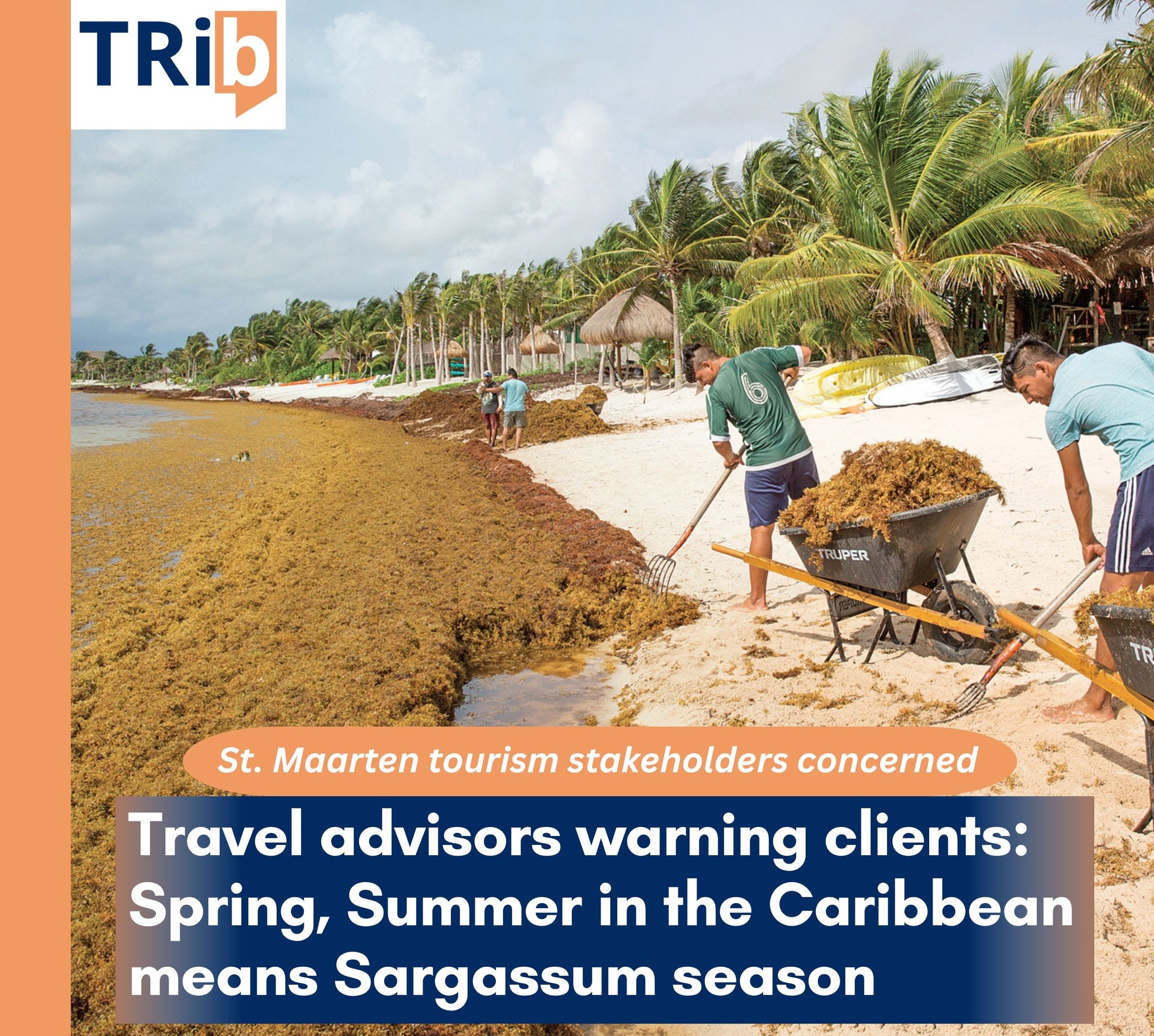GREAT BAY--Travel professionals across the Caribbean are being forced to adjust how they advise clients as the region grapples with an increasingly disruptive reality: sargassum season is now spring and summer. And it’s not a mild nuisance, it’s a full-blown tourism challenge.
The culprit, sargassum, is a brown seaweed that floats in island-sized mats across the Atlantic. While it plays a role in the open ocean’s ecosystem, it becomes a serious problem when it washes ashore. The algae pile up on coastlines, rot under the sun, and release a pungent hydrogen sulfide odor, often described as the stench of rotten eggs. The result? Once-pristine beaches become unswimmable, smelly, and unsellable.
According to a recent feature by NRC.nl, coastal destinations from Mexico to Trinidad are seeing record surges of the foul-smelling seaweed, with St. Maarten no exception. A quarter of the island’s beaches, including popular spots like Orient Bay, have become no-go zones due to the volume and stench of the algae.
With 38 million tons of sargassum expected to wash ashore across the region this year, nearly double the previous record, travel agents are now advising clients to rethink when and where they travel. One advisor, who identified themselves as “an honest travel agent,” wrote on Facebook: “Spring and summer have now become sargassum season. Please adjust your booking accordingly.”
Hotel owners like Ricardo Perez of Oyster Bay Resort are already feeling the effects. “Of course our guests complain. We make sure they can go to the beaches on the west coast,” Perez told NRC.nl, while noting he now spends $20,000 a month on daily clean-up using bulldozers and trucks. “This is of course not good for tourism.”
The situation is especially difficult for smaller properties and those on affected coastlines. There are no large-scale public solutions, no long-term containment strategies, and little government infrastructure in place to process the mountains of algae that wash ashore.
Paul Henriquez, president of the St. Maarten Hospitality & Trade Association, told NRC.nl that the private sector simply can’t keep up. “The amount of algae is so large that hoteliers cannot handle it logistically. Where should you put it on Sint Maarten? It's tons and tons.”
Henriquez, who lives in Point Blanche, also reported that the algae problem has returned to his own backyard. “It just filled up again this week. It starts to rot and smell.” Ferry services from Orient Bay to nearby Pinel Island are reportedly at a standstill due to the sheer volume of seaweed.
The sargassum crisis stretches well beyond St. Maarten. In Bonaire, biologist Danielle de Kool of STINAPA told NRC.nl that sea turtles became trapped in dense sargassum off Boka Ascension, with some failing to survive. On Curaçao, hotels and beach bars called on staff to help clear overwhelming amounts of seaweed, a battle they couldn’t win. “There was really no way to work against it,” De Kool said.
Sargassum is now a yearly environmental crisis made worse by warming oceans and shifting currents. For Caribbean nations and territories that depend on sun, sea, and sand, the consequences are serious, and for travel agents, honesty and adaptation are now part of the job.
“We have to realize that we are overwhelmed by sargassum every year, but we are still overwhelmed by it. That is not good for Sint Maarten as a tourist destination,” Henriquez said bluntly.
For travel advisors and booking agents, the message is now clear: when planning spring and summer trips to the Caribbean, ask about sargassum. Check forecasts, satellite tracking sites, and consider booking accommodations on the less-affected coasts. Because for the foreseeable future, the region’s high season may come with an unwanted brown tide.
Join Our Community Today
Subscribe to our mailing list to be the first to receive
breaking news, updates, and more.


